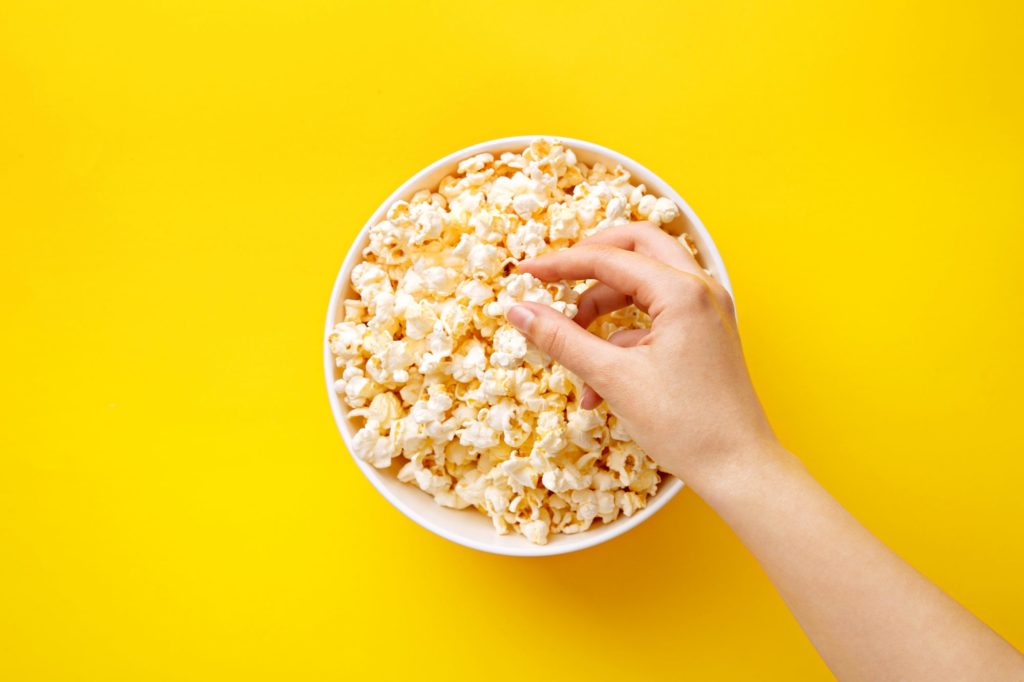When you start a new eating plan, the first thing you want to know is whether you can still enjoy your favorite foods. If you’re ready to embrace the keto diet (and you’ve run it by your doctor, to make sure it’s advised for you), that means being prepared to drastically cut your carbs and increase your intake of high-fat foods. Remember, the primary goal of the ketogenic diet is to get the body into ketosis—a metabolic state where the body mainly uses fat as fuel instead of carbohydrates.
So where does popcorn, the ultimate movie night/Netflix binge snack, fit into the plan? Is popcorn keto?
The short answer is no, Naomi Whittel, Gainesville, Florida-based author of High Fiber Keto, tells Health. Popcorn is made from corn, which is a grain, and grains (as a higher carb food) are generally on the keto nix list.
But wait—it’s not all bad news for popcorn devotees. “If you popped your own popcorn at home using coconut oil, drizzled it with some grass-fed butter and plenty of sea salt, two cups of it would contain about 12 grams of carbs and a couple of grams of fiber,” says Whittel. So if your goal with keto is to stay under 50 grams of total carbs per day, this appears to be a big thumbs-up for those two cups of home-popped popcorn.
However, there’s more to this than just the numbers. “For some, even this high-fat popcorn option will still spike blood sugar and pull them out of ketosis, or prevent them from getting into ketosis if they aren’t there yet,” explains Whittel.
In other words, for those who are already in ketosis, a little bit of popcorn here or there might work just fine. For others, once ketosis is established, they might choose to cycle out of ketosis at various intervals and include popcorn during these times.
If popcorn is really important to you, Whittel recommends waiting until you’re in ketosis, then trying it out as an experiment—seeing how you feel and what happens to your ketone levels. “This helps you to see how the food works for your individual body,” she says.
Remember, the keto diet—and any other eating plan, for that matter—can be adapted to suit you. “The answer to whether popcorn can fit on a keto diet depends on the individual’s carbohydrate limit and whether they are choosing to include grains,” Summer Yule, RD, based in Avon, Connecticut, tells Health.
Yule considers popcorn a nutritious food. “It’s a whole grain that provides some fiber as well as small amount of certain vitamins and minerals, including folate, niacin, thiamin, and vitamins B6, A, E and K,” she says.
But if you only eat popcorn after drowning it in added fats or coating it with sugar, another snack option may be a better choice, Yule advises. The answer to what might be a better alternative depends on what your goals are. Do they want to eat more veggies? Bump up your protein intake? Change up your body composition? Consulting an RD can help you figure out what foods you should be eating (on keto or any other diet plan) to achieve those goals.
For the healthiest popcorn experience, Whittel suggests going organic. Cynthia Sass, MPH, RD, Health’s contributing nutrition editor, previously told Health that she advises consumers to read the popcorn label and check the type of oil it’s been popped in. “The best oils are heart-healthy, anti-inflammatory monounsaturated fats (MUFAs), specifically avocado oil and extra virgin olive oil,” said Sass. “Oils that are higher in omega-6 fatty acids—such as corn oil, soybean oil, sunflower oil, safflower oil, and cottonseed oil—tend to be pro-inflammatory.”
